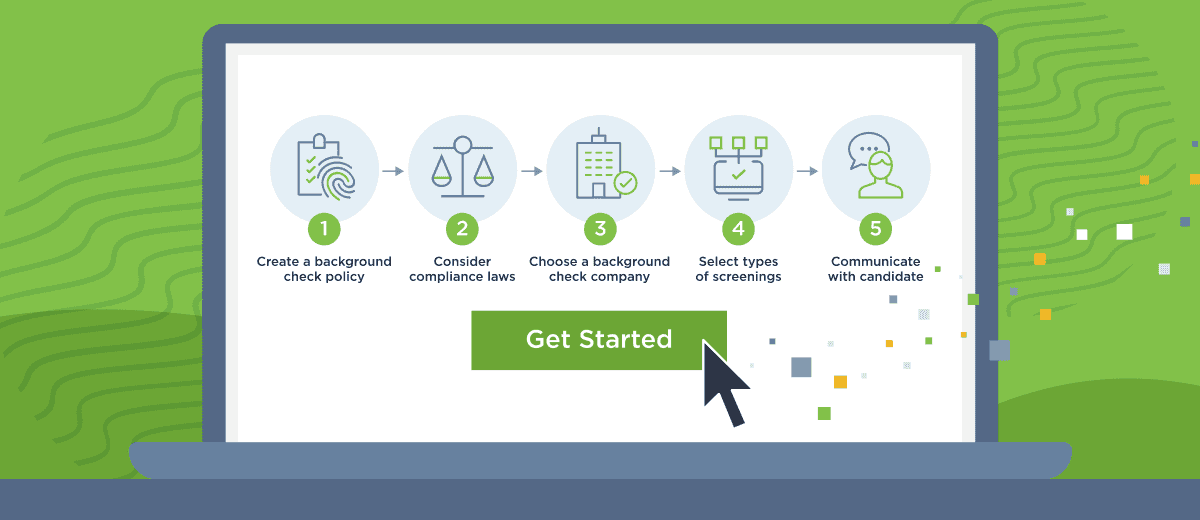

A background check can verify someone’s work history, experience, and education; uncover resume lies or omissions; and reveal a criminal history. Conducting employment background checks helps you make smarter hiring decisions, but it’s important your background check process is consistent, legal, and fair.
Here’s everything you need to know about running employment background checks.
Your workforce is the lifeblood of your company. You need qualified, trustworthy employees in order to hit your business goals — but building a high-quality team is no easy feat. More than half (56%) of the people in a recent survey lied on their resume, mostly around work experience, education, skills, and job duties. While a small fabrication may not be a big deal in some industries, it could be downright dangerous and irresponsible in others.
Candidate omissions can be just as bad — if not worse — than simply stretching the truth. For instance, someone with a recent history of violence may not be forthcoming about their past. An incident in the workplace could put customers and other employees in danger, which could lead to negligent hiring lawsuits and permanent damage to the company’s reputation.
Running a background check can help you mitigate these risks and improve your quality of hire.
A background check policy documents the details of your screening program, so it can be applied consistently across your organization. It should include three things:
A written background check policy helps you ensure a fair and transparent process, prevent discrimination, and avoid litigation and enforcement from federal agencies.
Background checks are governed by federal, state, and local laws and regulations. The employer is ultimately responsible for compliance, and failure to do so can result in costly fines, settlements, and lawsuits.
Here are four potential violations to be aware of:
Every business is unique, and it’s important to choose a background check provider that best fits your specific hiring and screening needs. The best background check service for your company will depend on your hiring volume, business size, number of locations, size of your HR team, budget, background screening policy, and in-house legal counsel. Some features to consider are:

You should be familiar with the different types of background checks and what’s included so you know what to expect and how each type of check can help you make timely and informed hiring decisions based on your industry and the positions for which you’re hiring. These include:
Criminal record checks: National criminal background checks, as well as state, federal and county criminal checks, report felony and misdemeanor convictions and current pending court cases. Depending on your provider’s policies, dismissed charges within seven years may also be reported. Examples of charges that may appear include vandalism, public intoxication, disorderly conduct, violent or sex crimes, fraud, and embezzlement. Employers use criminal record checks to assess whether a candidate could pose a threat to customers or create an unsafe work environment.
Civil court checks: County and federal civil court checks can help you learn about non-criminal suits, claims, and judgements where the candidate is listed as a respondent. These may include small claims, restraining orders, violations of civil rights, and bankruptcies, and may be especially important for positions where employees will have financial or management responsibilities.
Credit checks: An employment credit report shows a candidate’s full credit history (but not their credit score), including payment history, civil judgements, tax liens, bankruptcies, unpaid bills in collections, and recent credit inquiries. Reviewing credit history may be required for some jobs, and may be particularly important for positions where access to financial assets, transactions, and decisions are a primary responsibility.
Driving record checks: Motor vehicle reports (MVRs) confirm license validity and provide insight into a candidate’s driving history, including DUIs, suspensions, and moving violations. This may be important for positions where employees, volunteers, or contractors will operate motor vehicles for business purposes.
Drug screening: Drug testing provides evidence of recent use of specific prescription and illicit drugs. Routine employment drug testing may help employers maintain a safer, more productive workplace.
Employment verification: Validate your candidate’s employment history and job-related experiences. Employment history verification can confirm the information provided by a candidate is true; the work experience is sufficient to meet the position’s requirements; and past titles, achievements, or responsibilities are valid.
Education verification: Verify your candidate’s school attendance dates, majors, and degrees, diplomas or certificates earned are valid. An Education Verification search can help to mitigate the risk of hiring a candidate with false credentials, and help you comply with federal, state, local and industry regulations.
Healthcare sanctions checks: An OIG search and healthcare sanctions background check provides insight into a healthcare professional’s medical background, including any penalties, suspensions, or punitive or disciplinary actions. This helps you comply with federal regulations and confirm your healthcare practitioners are in good standing.
International background checks: Different types of international background checks can provide international criminal records, education credentials, and employment history for candidates living in the US who have previously lived, worked, or studied in other countries.
It’s important to communicate with candidates about your background check process so they know what to expect. Be open with your candidates about why you’re conducting the background check, and encourage openness in return. Let the candidate know that they’re welcome to see their background check results, dispute any inaccurate information, and add comments in writing, or speak with you, to explain any alerts.
Candidates have rights under the FCRA, laid out in the document A Summary of Your Rights. When you use a background check provider to screen a candidate for employment, you must:
The EEOC also recommends considering individual circumstances and context around a candidate’s criminal record. These include the nature and gravity of the offense, the time that has passed since the offense, and the offense’s relevance to the job sought. An individualized assessment allows the candidate to provide additional context about the offense, and gives them an opportunity to explain.
If you’re planning to run an employment background check for the first time, there are some additional things you should know:
Remote work has become much more common, resulting in fewer in-person interviews and more video interviews. To start, it’s a good idea to add an identity verification check to add an extra layer of security to the process. To help improve your remote hiring process, we’ve assembled a step-by-step guide to hiring remote employees.
How long a background check takes varies depending on the types of searches run. Some background check providers can provide basic background checks almost instantly or within the same day. Other screening services, such as county criminal record checks in counties where records aren’t digitized, or employer and education verifications, can take up to five days or more to complete.
Per FCRA regulations, you must verify that your company is a legitimate business before you can order a background check. The company credentialing process with a background check provider typically takes between one hour and one day to complete.
It’s possible to conduct a background check on your own, but it’s time-consuming and carries inherent risks. You may have to visit each jurisdiction’s courthouse in person, fill out record response forms, and wait for responses. Then you run the risk of losing your candidates to other employers or, worse, not getting the correct results back and basing your hiring decision on incorrect or incomplete information. Or if you use social media to screen your candidates, you run the risk of seeing restricted hiring criteria — like religion or race — and making biased hiring decisions.
Some background check providers can conduct employment and education verification checks, as well as professional reference check services. Reference check interviews that use a series of in-depth, open-ended questions may help you gauge a candidate’s character, learn how they might align with your company values, and understand how they may fit into your company culture.
Background checks are not a “one and done” thing. It’s common to conduct post-hire background checks annually — or more often in certain industries and positions. If you do, be sure to include an “evergreen clause” in your background check consent form, where allowed by state law.
There are 5 important steps to follow when performing a background check on someone.
An employer background check policy document should contain the details of your screening process including what types of checks will be conducted, and when, and how those checks will affect employment decisions. Learn More about Background Check Policies.
Are background checks governed by federal, state, or local law?Yes, background checks are governed by law and employers are ultimately responsible for compliance with the law and failure to do so can result in costly fines, settlements, and lawsuits. Learn more about Consent forms, Adverse action, Ban-the-box, and Title VII.
How do you choose a background check company?The best background check services for your company will depend on hiring volume, business size, number of locations, size of your HR team, budget, background screening policy, and in-house legal counsel. Some features to consider are:
Background checks vary widely and can show an employer a wealth of information about a candidate. Common types of checks include criminal records, civil court records, driving records, drug screening, employment verification, education verification, healthcare sanctions, and international background checks. To learn more about which checks are right for you, read “Step 4: What Are The Different Types of Background Checks?”.
How do you communicate background check results to an employment candidate?It’s important to communicate with candidates about your background check process so they know what to expect. Be open with your candidates about why you’re conducting the background check, and encourage openness in return. Let the candidate know that they’re welcome to see their background check results, dispute any inaccurate information, and add comments in writing, or speak with you, to explain any alerts. Candidates have rights under the FCRA so be sure to comply with these requirements. Read More
A background check is a worthwhile investment to build a high quality workforce that will help you reach your business goals. Tailor your screening policy to your industry and positions, and find a provider that can deliver the data you need — while helping you stay in compliance. With informed hiring decisions, you can improve your quality of hire and mitigate risk.
GoodHire makes employment screening easy. Our US-based support team can provide expert recommendations on which packages work best for your screening needs, while also saving you money by not paying for screens you don’t need. Plus, GoodHire’s compliance expertise is unparalleled. Find out how we can help.